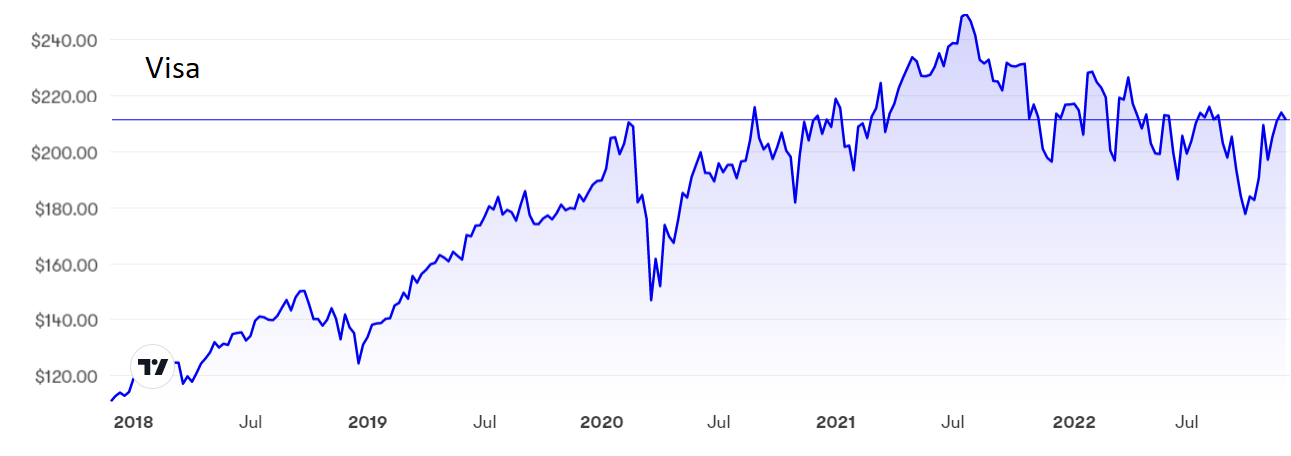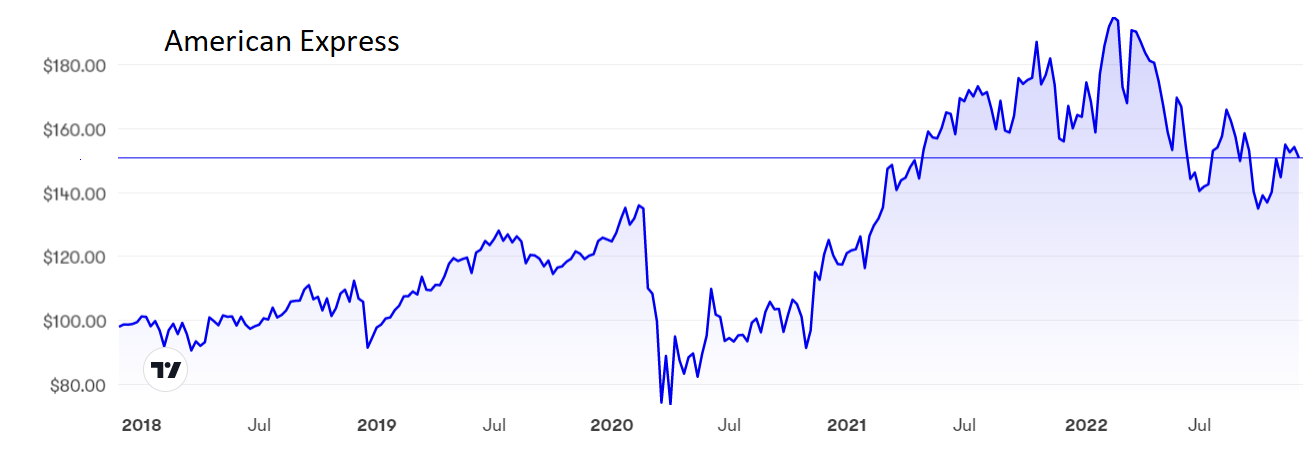Which of these two finance giants should you put your money on?
30th November 2022 07:51
by Rodney Hobson from interactive investor
More people are using plastic to pay for everything from essentials to summer holidays, and these businesses are beneficiaries. Overseas investing expert Rodney Hobson thinks it could be a good time to buy one of them.

A new chief executive and a new executive chairman have been appointed at credit and debit card issuer Visa Inc Class A (NYSE:V). If the names sound familiar, that is because they are. A game of musical chairs leaves a highly successful team still in charge of a company whose shares do not fully reflect the stellar financial performance this year.
Ryan McInerney takes over as chief executive officer at the beginning of February after a successful decade running Visa’s global businesses. Current CEO Alfred Kelly switches into the chair.
- Discover more: Buy international shares | Interactive investor Offers | Most-traded US stocks
Visa had a pretty good year ending on 30 September. In its fourth quarter, revenue jumped 19% compared with a year earlier to almost $8 billion. The favourable post-pandemic trends seen earlier in the year – strong consumer spending, resilient online commerce and a recovery in cross-border travel – were once again in evidence. Net income increased by 10% to $3.94 billion.
That meant revenue, profits and earnings per share were all up more than 20% for the 2021-22 financial year as a whole.
Cautious investors may worry that the final quarter, good as it was, showed lower growth than the earlier part of the year but that would be to ignore the distortions of the bounce back from Covid-19 restrictions. There is some short-term uncertainty, as there is for every business, but long-term growth looks assured.
The shares had such a strong run, until they peaked at $250 in July last year, that a correction was inevitable but, given the great prospects, at $209 they no longer look overpriced despite a chunky price/earnings (PE) ratio of 30.2 and a meagre yield of 0.75%

Source: interactive investor. Past performance is not a guide to future performance.
Similar figures, with similar explanations, have been produced at smaller rival American Express Co (NYSE:AXP), where revenue was up 24% to $13.56 billion, narrowly topping expectations and setting a record for the second quarter in a row.
Net income edged up only 2.9% to $1.88 billion as Amex set aside $778 million to cover possible bad debt just 12 months after it released $191 million set aside in previous years. This is a less severe repeat of what happened in the April-June quarter, when the adverse swing in provisions caused a fall in profits.
- Nasdaq index: a masterclass in chart behaviour
- Nasdaq’s record high one year on: will 2023 be a year to celebrate?
With interest rates rising, bad debt provisions are probably with us again for some time, especially as it is younger cardholders who are stepping up their credit card spending rather than older ones who have had time to get their finances on a more solid footing. Likewise, smaller and medium businesses are using their cards more rather than well-established large companies. However, Amex is in good enough financial shape to cope easily.
The return of foreign holidays and business trips, as with Visa, has been an important factor in a surge in spending on premium credit cards. So has a spending spree on entertainment as more affluent cardholders continued a trend set earlier this year to make up for the lost months of the pandemic.

Source: interactive investor. Past performance is not a guide to future performance.
Amex has stuck to its guidance that full-year revenue will be up 23-25%, having raised this forecast in July, and it is reasonable to believe that the trend in profits is improving.
The shares peaked at $195 in February but are now back to $154, where the PE is 15.13 and the yield is 1.32%.
- Will the ‘quality’ investing style of Terry Smith and Nick Train recover?
- Resilient stocks the pros are backing as inflation winners
Hobson’s choice: If you are already in Visa there is no cause to sell at current levels. The good news is that there looks to be a floor at $180; the bad news is that the shares have recently found a ceiling at $220 and even if that is broken there could be further resistance at $230. Look to buy in below $210.
Amex is not so fully priced and with the downside probably limited to $140, this could be a good time to buy.
Rodney Hobson is a freelance contributor and not a direct employee of interactive investor.
These articles are provided for information purposes only. Occasionally, an opinion about whether to buy or sell a specific investment may be provided by third parties. The content is not intended to be a personal recommendation to buy or sell any financial instrument or product, or to adopt any investment strategy as it is not provided based on an assessment of your investing knowledge and experience, your financial situation or your investment objectives. The value of your investments, and the income derived from them, may go down as well as up. You may not get back all the money that you invest. The investments referred to in this article may not be suitable for all investors, and if in doubt, an investor should seek advice from a qualified investment adviser.
Full performance can be found on the company or index summary page on the interactive investor website. Simply click on the company's or index name highlighted in the article.
Disclosure
We use a combination of fundamental and technical analysis in forming our view as to the valuation and prospects of an investment. Where relevant we have set out those particular matters we think are important in the above article, but further detail can be found here.
Please note that our article on this investment should not be considered to be a regular publication.
Details of all recommendations issued by ii during the previous 12-month period can be found here.
ii adheres to a strict code of conduct. Contributors may hold shares or have other interests in companies included in these portfolios, which could create a conflict of interests. Contributors intending to write about any financial instruments in which they have an interest are required to disclose such interest to ii and in the article itself. ii will at all times consider whether such interest impairs the objectivity of the recommendation.
In addition, individuals involved in the production of investment articles are subject to a personal account dealing restriction, which prevents them from placing a transaction in the specified instrument(s) for a period before and for five working days after such publication. This is to avoid personal interests conflicting with the interests of the recipients of those investment articles.